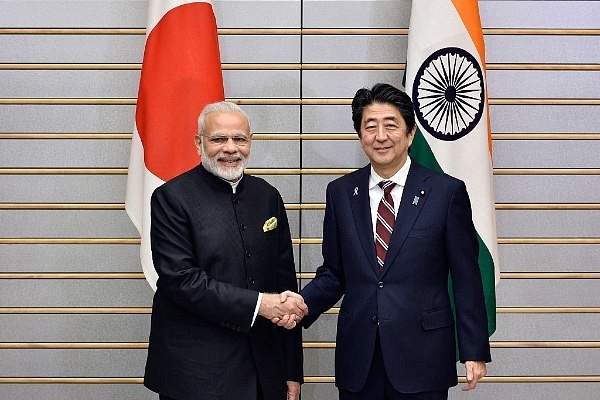Insta
National Security, Welfare Schemes, Foreign Policy Tops Modi Government’s Agenda In First 50 Days Of NDA-II

PM Narendra Modi and his Japanese counterpart Shinzo Abe in Tokyo (FRANCK ROBICHON/AFP/Getty Images)
With the focus on national security, delivery of new welfare schemes and significant foreign policy engagements, the Prime Minister Narendra Modi-led central government has set a fast pace of decision making in its first 50 days, reports Times of India.
According to the report, important measures on national security have been pushed up such as the clean of Jammu and Kashmir Bank, which was closely linked to terror funding and was misused by the separatists in the Valley. The Centre has also decided to improve the financial benefits of the central armed police forces.
The government has also announced a set of labour reforms that are intended to benefit 49 crore workers and will also make business smoother and less restricted with red tape.
Besides, the amendments to the Insolvency and Bankruptcy Code were intended to ensure timely and efficient disposal of cases regarding firms that had defaulted on loans and had left the investors in the lurch.
In a bid to save poor people from financial frauds, the government has banned the unregulated financial schemes. It has also offered more incentives for the middle class on affordable housing by way of tax breaks. The government has also announce that it will offer pension to around 3 crore retail traders and small shopkeepers.
Besides labour reforms and enacting strong laws against frauds who dupe the poor, death penalty for child sexual assault, higher MSP for Kharif crops, are some of the people-oriented decisions the government took in the last fifty days, reports LiveMint.
The government is also focusing on investment and related efforts to increase economic growth that would result in higher job creation. Another area of focus is infrastructure, which is a key requisite for a modern nation and growing economy with the PM Modi having set a target of making India a $5 trillion economy in five years. A sum of Rs 100 lakh crore is proposed to be invested in the next five years for the infrastructure development.
On the foreign policy front, the engagement with world leaders started with the BIMSTEC leaders arriving to witness PM Modi's swearing-in. Later in June, PM Modi attended the Shanghai Cooperation Summit, and the G20 summit in Osaka, Japan, where he had bilateral and pull aside meetings with several leaders, including United States President Donald Trump.
PM Modi also visited Sri Lanka and Maldives and showed his strong belief in the Neighbourhood First policy.
Support Swarajya's 50 Ground Reports Project & Sponsor A Story
Every general election Swarajya does a 50 ground reports project.
Aimed only at serious readers and those who appreciate the nuances of political undercurrents, the project provides a sense of India's electoral landscape. As you know, these reports are produced after considerable investment of travel, time and effort on the ground.
This time too we've kicked off the project in style and have covered over 30 constituencies already. If you're someone who appreciates such work and have enjoyed our coverage please consider sponsoring a ground report for just Rs 2999 to Rs 19,999 - it goes a long way in helping us produce more quality reportage.
You can also back this project by becoming a subscriber for as little as Rs 999 - so do click on this links and choose a plan that suits you and back us.
Click below to contribute.
Latest